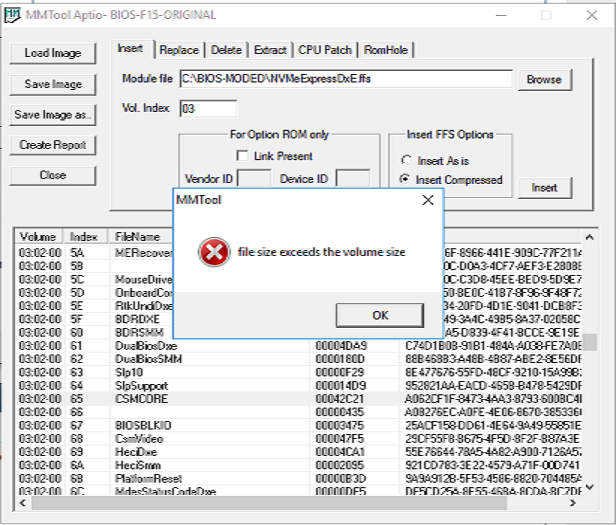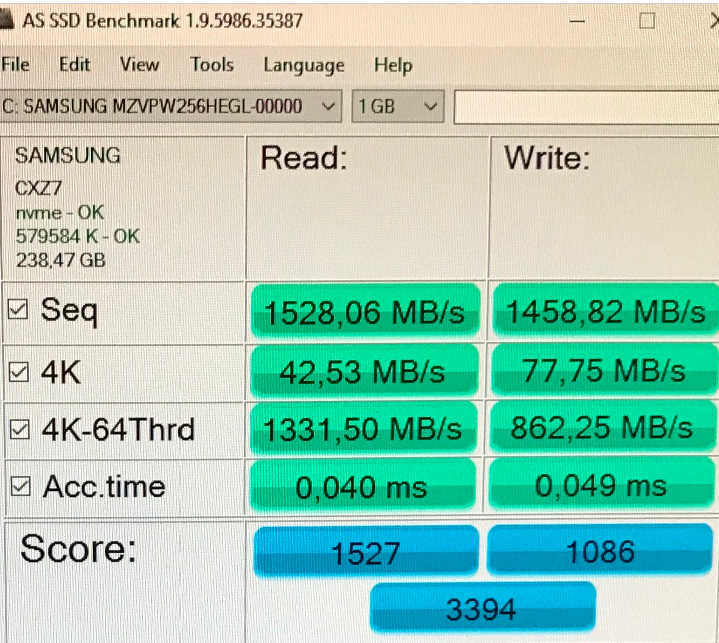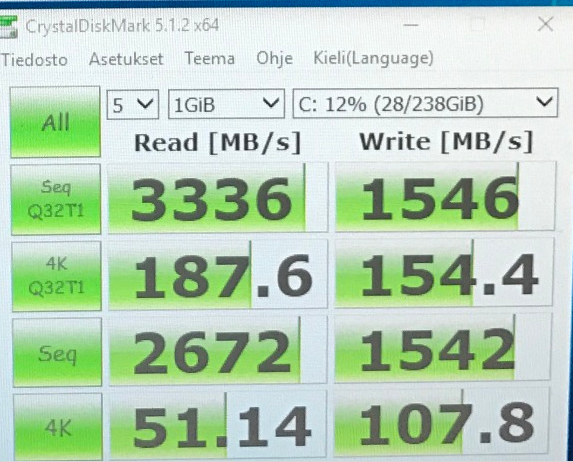The Rufus setting, which I have mentioned, will exactly do that.
I have an Asus SABERTOOTH P67 motherboard. My questions is if this motherboard support booting from NVMe if I modify the BIOS.
Sabertooth P67
I am pretty sure, that the answer is: "Yes!"
According to my knowledge and own experience the method, which I have explained wthin the start post of this thread, will work with all Intel chipset systems, whose mainboard has an AMI UEFI BIOS.
I am pretty sure, that the answer is: "Yes!"
According to my knowledge and own experience the method, which I have explained wthin the start post of this thread, will work with all Intel chipset systems, whose mainboard has an AMI UEFI BIOS.
Ohh…this is nice…will I have slower speed m.2 ssd …if adapter will be installed in Pcie 2.0 not 3.0 ?
Yes, but you may not even recognize the difference while working with your computer.
Excuse me, my English skill isn’t good, @Fernando I’ve followed your instruction at page 1, but when I press Insert button I got below error, I don’t understand, my drive has about 150GB free?

My mother board is Gigabyte B85M-D3H rev 1.2, can you help me?
Thanks in advance!
EDIT by Fernando: MMTool screenshot cut out, resized and re-inserted, extremely big sized picture removed (to save space),
@baodng :
Welcome at Win-RAID Forum!
This message means, that there is a space problem within the BIOS and not within any of your Disk Drives.
Solution options:
- Try to insert the already pre-compressed NVMe module (you can find the download link within the start post of this thread).
- If you should still get the error message, you may have to remove any other module from the BIOS, which your system doesn’t need and use.
Off topic:
If you want to take and post a screenshot from any GUI interface (here: AMI Aptio MMTool), hit the ALT+PRINT buttons of your keyboard, then run MS Paint, hit the Menu options "Paste" and then "Crop". Now you can save the screenshot as *.png or *.jpg file and insert it into your post.
Good luck!
Dieter (alias Fernando)
Was looking through the latest Clover release and found that there is a new NVMExpressDxe module driver in the Clover version 3773 release. It is about 8kb larger
than the original file I experimented with last year. I attempted to convert it to an FFS file though not sure if I corrected the checksum and could use Sonix’s help with
that. I also do not know how “NVMExpressDxe” string into the file as a name that is displayed inside MMTool. Anyhow I have a file available for testing if you want it Fernando
though you may prefer Sonix’s assitance in its proper conversion as my file is untested.
Thanks
@davidm71 :
Yes, I am interested in that updated NVMeExpressDxE file.
Please attach it or give me a download link.
Hi,
I’ve attached the file in an unmodified form. I have also converted it to an ffs but have not had a chance to test it so not going to post that one for safety reasons. Maybe Sonix can convert it properly for you.
Thank you
NvmExpressDxe-64-3773.efi.zip (15.3 KB)
Hi,
How can I tell what NVME driver my bios is running?
MAXIMUS-VIII-HERO-ALPHA-ASUS-2202
Is there a newer NVME driver or is the one I am running it?
Here is the output from the MMtool
http://pastebin.com/Pr2syc5n
@davidm71 :
Thank you for very much for having attached the new "pure" EFI NVMe module, which has been compiled by the Clover Team.
@SoniX :
On the basis of the new NVMExpressDxE.efi file I have built a new NVMExpressDxE.ffs file, which may be usable with Intel chipsets from 6-Series up.
It would be much appreciated, if you can take the time to check both attached files.
What do you think? Shall we replace the older NVMe modules by these ones? Will they work better?
Thanks
Dieter
new NVMExpressDxE modules_2.rar (28.8 KB)
Whom do you want to tell it?
AFAIK these NVMe modules contain neither a version number nor a date.
So I cannot answer your question.
No problem as I was very curious and going to try it out later this afternoon. It is approximately 8 kb bigger in file size and can assume they’ve added more NVMe drive support or possibly more logic. I inquired on the Clover discussion thread but got ignored by the developers. Good luck.
My apologies Fernando, I will try and figure out how to extract them.
Sorry for being a Noob but I do appreciate you responding.
Found EFI AMI NVMe Driver GUID 634E8DB5-C432-43BE-A653-9CA2922CC458
https://dl.dropboxusercontent.com/u/4066…aded/nvme_as_is (uncompressed)
https://dl.dropboxusercontent.com/u/4066…me_uncompressed (Compressed)
This comes from my asus maximus vii hero alpha bios version 2022 dated 2016/09/26
http://dlcdnet.asus.com/pub/ASUS/mb/LGA1…A-ASUS-2202.zip
How’s that? I think I got it … hopefully ![]()
@Fernando
2 FFS file including compressed. I can not say what kind of assembly, and whether it will work. Unfortunately I did not check, because there is no correct controller and the disk.
These drivers have all BIOS since 9th chipset, and they are not universal. Moreover, it is one (Int13) of the 3-ex files AMI NVMe.
NvmeExpressDxE_2.rar (31.3 KB)
Quick question,
I have seen two ways to add NVME support. The first (yours) is to add the the module from the first post. The second is to pull three NVME related modules from a Z97 BIOS, and insert those. I was wondering if there is a difference in the result of the two methods?
I am trying to add NVME support to a ASrock z77 Extreme9 with an i7-3770k, in order to add one of the new 600p SSDs. Thanks for all the work you have put into this!
So these NVME drivers are basically proprietary and they can’t be touched or edited, is what I think you told me.
I appreciate the response ![]() and it’s good to know if that’s the case. This way I don’t go and do something stupid - and believe me, I am the dumb.
and it’s good to know if that’s the case. This way I don’t go and do something stupid - and believe me, I am the dumb.
I added a module "NVMeExpressDxE.ffs" Dell Precision T5600.
Boot works well. But speed is not perfect.


1. Samsung sm961 256gb nvme installed gpu second slot. PCIe v3 x16.
2. Windows 10 1607 64bit GPT uefi and samsung nvme driver.
3. Bios settings: Intel SpeedStep and C-States control disable.
4. Write caching enabled and write-cache buffer flushing disabled.
Can someone help?
The problem is: 4K Q32T1 test
EDIT by Fernando: Attached picture optimized and reinserted as 2 “screenshots”